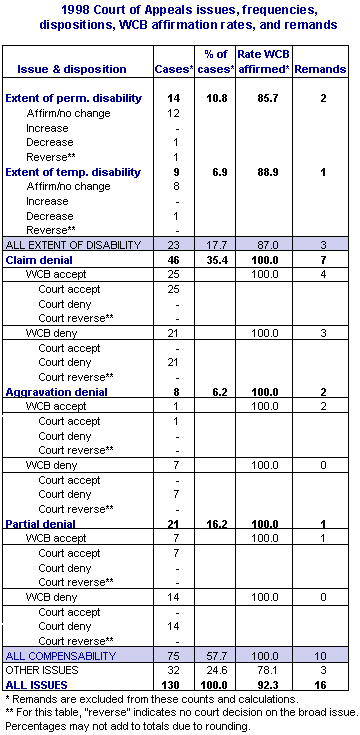
In 1998 there were 251 appeals of Workers’ Compensation Board (WCB) decisions to the Oregon Court of Appeals. See Figure 1. The number of requests increased 12.1 percent from 1997, while the number of WCB orders on review increased by about 18.0 percent. So the appeal rate dropped to just over 20 percent, about a percentage point below that for 1995-1997.

There were 130 court decisions in 1998 (based on date of the slip opinion), 18.8 percent fewer than in 1997. This count excludes court dismissals and five orders on reconsideration by the court. The count also excludes 16 court remands to the board, where the court did not (1) rule on the primary issue, (2) direct a specific action by the board, (3) rule on a major or precedent-setting sub-issue, nor (4) determine that the board applied the wrong standard. The reasons for remanding: the board erred (six cases), the board did not have the benefit of a recent court decision (four cases), recent law change (four cases), and the board needs to consider or determine something (two cases).
Order counts here also exclude two non-complying insurer cases, one safety case, and 11 Department of Consumer and Business Services (DCBS) contested cases. Contested cases are discussed briefly in the final section of this report.
The number and the relative frequency of each
issue are given in the table. Cases without one of the  specified issues are counted
in the “other issues” category. The relative frequency
of extent of disability was the highest since 1994, while that
for compensability was the second-highest in 10 years (after
1997’s record-high 59.4 percent). The percentage of cases
classified as “other issue” was the lowest of the past
10 years. The most frequent other issues (including those
in cases with a specified issue) were insurer penalty (20 cases),
responsibility (19 cases), attorney fees (8 cases), and denial
propriety, evidence, jurisdiction, and timeliness (5 cases each).
specified issues are counted
in the “other issues” category. The relative frequency
of extent of disability was the highest since 1994, while that
for compensability was the second-highest in 10 years (after
1997’s record-high 59.4 percent). The percentage of cases
classified as “other issue” was the lowest of the past
10 years. The most frequent other issues (including those
in cases with a specified issue) were insurer penalty (20 cases),
responsibility (19 cases), attorney fees (8 cases), and denial
propriety, evidence, jurisdiction, and timeliness (5 cases each).
Court dispositions and WCB affirmation rates are given in the table. The court reversed the board in two permanent disability cases, one temporary disability case, and seven other-issue cases. (These counts exclude remands; remand counts for each issue are also given in the table.) The WCB affirmation rates were 100 percent for the compensability issues and 92.3 percent overall (see Figure 2).
The WCB acceptance rate and court acceptance rate for the compensability issues were 44%; last year they were both 40 percent.

The worker was the petitioner in 56.8 percent of the cases, and SAIF was the insurer in 32.2 percent of the cases. There were two cases about permanent total disability (PTD). In one case, the court affirmed a PTD reinstatement by the board. In the other, the court affirmed an award of permanent partial disability where the worker wanted an earlier PTD award reinstated. The median time lag from appeal to order was 330 days (10.9 months), somewhat longer than 1997’s 318 days. The median time from injury to order was 1,330 days (3.6 years).
Eleven contested cases (disputes heard by a Workers’ Compensation Division administrative law judge) were decided by the court in 1998. Six of the cases were medical treatment disputes. The other cases were disputes about palliative care, managed care treatment, change of attending physician, medical fees, and jurisdiction on denial of reconsideration (one case each). The worker was the petitioner in seven cases. The court affirmed the director in 10 cases (90.9 percent), and the worker prevailed in five cases (45.5 percent).
If you have questions about the information contained in this document please contact by e-mail or phone: Russell Reed, Research Analyst, Research & Analysis Section, Information Management Division (503) 947-7343.
This document was originally published in May 1999.
Document URL: http://www.cbs.state.or.us/external/imd/rasums/8_2340.html
[Printed form: 440-2340(05/98/IMD)]
In compliance with the Americans with Disabilities Act (ADA), this publication is available in alternative formats by calling (503) 378-4100 (V/TTY).